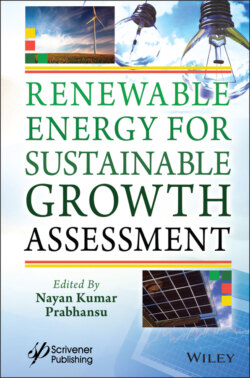Читать книгу Renewable Energy for Sustainable Growth Assessment - Группа авторов - Страница 57
2.4 Sustainability Assessment of RE Technologies
ОглавлениеAssessment of RE technologies based on sustainability indicators is a complex task as indicators are generally conflicting in nature. Several assessment studies have been done with respect to the sustainability of electricity generation technologies at a global level [32–40] and also specifically of RE technologies [41–45], while some researchers have focused explicitly on the national level assessment of RE technologies, for example, for Turkey [44, 47], Irish city [46], Scotland [48], India [14, 15], Island of Sardinia [49], UK [50], Island of Crete in Greece [51], North Korea [52].
MCDM methods are the most common methods for assessing the sustainability of generation technologies; for example, analytic hierarchy process (AHP) [14, 44, 45, 52], MAVT [35, 37, 38], the weighted sum method (WSM) [34], the preference ranking organization method for enrichment evaluation (PROMETHEE) [48, 51], the elimination and choice translating reality (ELECTRE) [49], TOPSIS [41], (MULTIMORA, MACKBETH, NAIADE, CORPAS) [32, 41, 44, 46, 50].
The advantage of MCDM methods is that it allows considering all the objectives and indicators at the same time while making decisions [48, 53]. In the case of qualitative approaches, the value of indicators is expressed in the form of linguistic terms (e.g., low, high, very high), and due to the possibility of vagueness in a human decision, uncertainty is always associated with the result. Fuzzy combined with the MCDM method has proven to be useful in handling qualitative indicators with associated uncertainties [53, 54]. The fuzzy combined with MCDM methods have found vast application in the assessment of the energy system’s sustainability [43, 44, 47, 48, 55], and electricity distribution planning considering uncertainties [56, 57].
As far as sustainability assessment studies at a national level for India are considered there are majorly two studies [14, 15] done using MCDM applications. The study [14] accessed only three RE technologies i.e., wind power, solar power, and biomass and, did not consider small hydropower and large hydropower during the assessment. The assessment applied the AHP based on the Delphi technique and evaluated wind power as the most favourable technology. In another study [15], wind power, solar power, small hydropower, biomass, and geothermal were accessed using fuzzy-AHP using a wide range of sustainability indicators. However, the study [15] did not consider any social indicators.
The above-discussed limitations reviewed in the previous studies are addressed in the present study. Thus, the present study assessed all the RE technologies contributing to Indian grid-connected power using a range of technical, economic, environmental, and social indicators. The study also addressed the uncertainties associated with input data using fuzzy-TOPSIS and MCS.
Sustainability assessment of RE technologies required the following steps:
